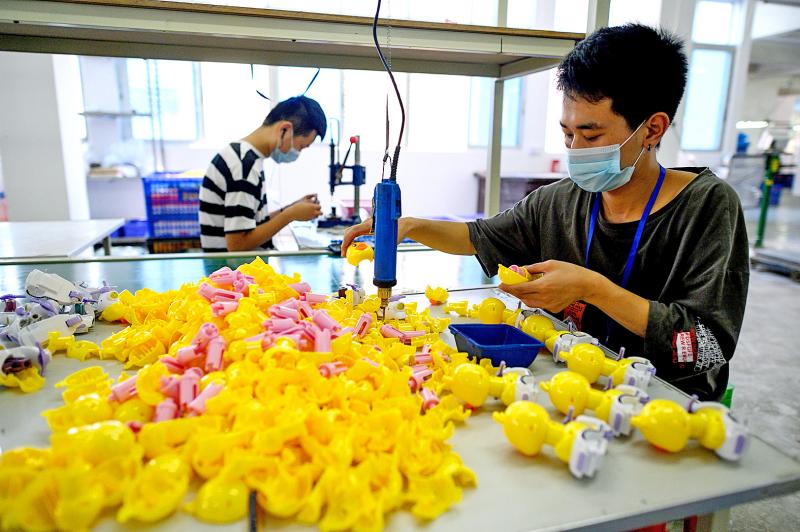Asia’s factory pain deepened last month as the slump in global trade caused by the COVID-19 pandemic worsened, with export powerhouses Japan and South Korea suffering the sharpest declines in business activity in more than a decade.
A series of manufacturing surveys released yesterday suggest that any rebound in businesses would be some time off, even though China’s factory activity unexpectedly returned to growth last month.
China’s Caixin/Markit Manufacturing Purchasing Managers’ Index (PMI) hit 50.7 last month, marking the highest reading since January as easing of lockdowns allowed companies to get back to work and clear outstanding orders.

Photo: AFP
However, with many of China’s trading partners still restricted, its new export orders remained in contraction, the private business survey showed yesterday.
China’s official PMI survey on Sunday showed that the recovery in the world’s second-largest economy was intact, but fragile.
Japan’s factory activity last month shrank at the fastest pace since 2009, a separate private sector survey showed.
The final au Jibun Bank Japan Manufacturing PMI in April fell to a seasonally adjusted 38.4 from 41.9, its lowest since March 2009.
South Korea also saw manufacturing slump at the sharpest pace in more than a decade.
The IHS Markit PMI edged down to 41.3, the lowest since January 2009 and below 41.6 in April.
Capital Economics Ltd said that the region’s manufacturing sector is in deep recession.
“Industry is likely to have seen an initial jump from the easing of lockdown restrictions. And things are likely to continue improving very gradually over the coming months as external demand recovers,” Capital Economics wrote. “But output is still likely to be well below normal levels for many months to come, as domestic and global demand remain very depressed.”
Taiwan’s manufacturing activity also fell last month. Vietnam, Malaysia and the Philippines saw PMIs rebound from April, although the indices all remained below the 50-mark threshold that separates contraction from expansion.
Official data showed South Korea extending its exports plunge for a third straight month.
India’s factory activity contracted sharply, extending the major decline seen in April as a government-imposed lockdown hammered demand.
Asia’s economic woes are likely to be echoed in other parts of the world, including Europe, where economies continue to suffer huge damage in factory and service sectors.
With many countries starting to ease lockdown restrictions imposed to stop the spread of the virus, which has infected over 5.5 million people globally, equity markets are rallying on hopes for a swift return to health and prosperity.
However, the trough in global economic activity would be deeper and the rebound is likely to take longer than previously predicted as the pandemic spreads in waves.
The IMF last month said that the global economy would take much longer than expected to recover fully from the virus shock, suggesting a downgrade to its projection for a 3 percent contraction this year.
A US-China spat over Hong Kong’s status and Beijing’s handling of the pandemic could sour business sentiment and add to already huge strains on the global economy.

Taiwan Semiconductor Manufacturing Co (TSMC, 台積電) last week recorded an increase in the number of shareholders to the highest in almost eight months, despite its share price falling 3.38 percent from the previous week, Taiwan Stock Exchange data released on Saturday showed. As of Friday, TSMC had 1.88 million shareholders, the most since the week of April 25 and an increase of 31,870 from the previous week, the data showed. The number of shareholders jumped despite a drop of NT$50 (US$1.59), or 3.38 percent, in TSMC’s share price from a week earlier to NT$1,430, as investors took profits from their earlier gains

In a high-security Shenzhen laboratory, Chinese scientists have built what Washington has spent years trying to prevent: a prototype of a machine capable of producing the cutting-edge semiconductor chips that power artificial intelligence (AI), smartphones and weapons central to Western military dominance, Reuters has learned. Completed early this year and undergoing testing, the prototype fills nearly an entire factory floor. It was built by a team of former engineers from Dutch semiconductor giant ASML who reverse-engineered the company’s extreme ultraviolet lithography (EUV) machines, according to two people with knowledge of the project. EUV machines sit at the heart of a technological Cold

TAIWAN VALUE CHAIN: Foxtron is to fully own Luxgen following the transaction and it plans to launch a new electric model, the Foxtron Bria, in Taiwan next year Yulon Motor Co (裕隆汽車) yesterday said that its board of directors approved the disposal of its electric vehicle (EV) unit, Luxgen Motor Co (納智捷汽車), to Foxtron Vehicle Technologies Co (鴻華先進) for NT$787.6 million (US$24.98 million). Foxtron, a half-half joint venture between Yulon affiliate Hua-Chuang Automobile Information Technical Center Co (華創車電) and Hon Hai Precision Industry Co (鴻海精密), expects to wrap up the deal in the first quarter of next year. Foxtron would fully own Luxgen following the transaction, including five car distributing companies, outlets and all employees. The deal is subject to the approval of the Fair Trade Commission, Foxtron said. “Foxtron will be

INFLATION CONSIDERATION: The BOJ governor said that it would ‘keep making appropriate decisions’ and would adjust depending on the economy and prices The Bank of Japan (BOJ) yesterday raised its benchmark interest rate to the highest in 30 years and said more increases are in the pipeline if conditions allow, in a sign of growing conviction that it can attain the stable inflation target it has pursued for more than a decade. Bank of Japan Governor Kazuo Ueda’s policy board increased the rate by 0.2 percentage points to 0.75 percent, in a unanimous decision, the bank said in a statement. The central bank cited the rising likelihood of its economic outlook being realized. The rate change was expected by all 50 economists surveyed by Bloomberg. The